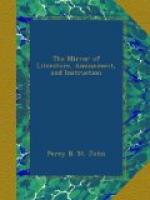But during the leisure which was afforded by his tedious captivity, it is certain that James applied himself to severer studies than either his military exercises or his cultivation of music. He was acquainted with the Latin language, as far, at least, as was permitted by the rude and barbarous condition in which it existed previous to the revival of letters. In theology, oratory, and grammar, in the civil and the canon laws, he was instructed by the best masters; and an acquaintance with Norman French was necessarily acquired at a court, and amongst a people, where it was still currently spoken, and highly cultivated. Devoted, however, as he was to these pursuits, James appears to have given his mind with a still stronger bias to the study of English poetry, choosing Chaucer and Gower for his masters in the art, and entering with the utmost ardour into the great object of the first of these illustrious men,—the improvement of the English language, the production of easy and natural rhymes, and the refinement of poetical numbers, from the rude compositions which had preceded him.[23] In the concluding stanza of the King’s Quair, a work composed by the Scottish King shortly before his return to his kingdom, he apostrophizes Gower and Chaucer as his dear masters, who sat upon the highest steps of rhetoric, and whose genius as poets, orators, and moralists, entitled them to receive the most exalted honour.
[23] Ellis’s Specimens, vol. i. p. 205.
Unto the hymis of my maisteris dere,
Gowere and Chaucere, that
on steppis satt
Of rhetorick, quhill thai war lyvand here,
Superlative as
poets laureate,
In moralitee and
eloquence ornate,
I recommend my buik in lynis seven,
And eke their saulis unto the blisse of
hevin.
* * * * *
THE BATTLE OF WATERLOO.
(From the Private Correspondence of a Woman of Fashion.)
Bruxelles, June 24, 1815.
On the first day we had so little idea of the vicinity of the engagement, that I drove out with a Belgian family in an open carriage towards the Bois de Soignies. But we were obliged to retreat precipitately, and take another direction across the country, and pass through a different barriere through the town to my residence. They wished me to accept an instant asylum with them. The house of Monsieur D’H—— was built over part of the old palace; and he had prepared one of the extensive caves for his family, in the event of the town being given up to the sword and rapine. I promised to avail myself of their kind offer, should the peril become more urgent; but I resolved to remain another day in our villa. Towards five the following morning, I was roused from the sofa on which I had thrown myself, by the trampling of horses, and the cries of the people of the suburbs. I flew to the window and beheld a troop of Belgians in full flight,




